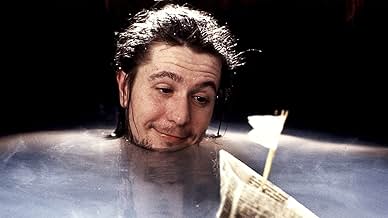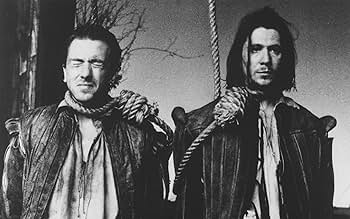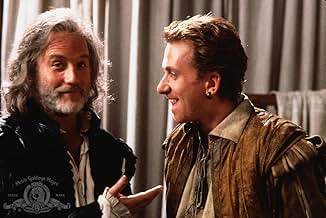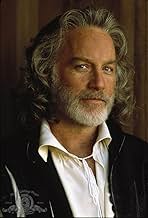Rosencrantz & Guildenstern sont morts
Original title: Rosencrantz & Guildenstern Are Dead
- 1990
- Tous publics
- 1h 57m
IMDb RATING
7.3/10
25K
YOUR RATING
Two minor characters from the play 'Hamlet' stumble around unaware of their scripted lives and unable to deviate from them.Two minor characters from the play 'Hamlet' stumble around unaware of their scripted lives and unable to deviate from them.Two minor characters from the play 'Hamlet' stumble around unaware of their scripted lives and unable to deviate from them.
- Awards
- 3 wins & 2 nominations total
Serge Soric
- Tragedian
- (as Srdjan Soric)
Sven Medvesek
- Laertes
- (as Sven Medvesck)
- Director
- Writer
- All cast & crew
- Production, box office & more at IMDbPro
Featured reviews
As an architect, I am often asked what is the world's best building. The answer: a small chapel outside Barcelona started by Gaudi but never finished. We have the model (a bunch of strings) and the basement. But when one visits, it is a profoundly lifechanging place. Gaudi exceeded the building's budget, and then that of the whole community (which was to have been built) before getting out of the ground. But the ambition was so grand, one can see it with only the barest explicit minimum. But, you have to have the reference of what the master intended.
Hamlet is the same. It was never really finished, being so large a conception. Shakespeare tinkered and added over decades. So what Stoppard does here is expand Hamlet by shrinking it. The plot is only glimpsed, but that part was always incidental anyway. The play is about reasoning, and when things are real and when not, and about what element of reality is causal. So instead of giving us the language, Stoppard seizes on one device, the play within the play.
In the raw Hamlet, this is pretty rich, but Stoppard weaves new dimensions of inversion and self-reference. There are at least four levels of play here, and we keep switching about, together with most of the characters. This is not just amusing, but elaborates on `Hamlet,' when is fate real? would it change if we could see the larger clockworks of the universe? does language (specifically query) aid in this endeavor? considering that, are ideas tied to time and fate? This last point is comically illustrated as one of the pair (they don't know who is who) keeps `stumbling' on great ideas, which then vanish.
The play (Stoppard's first) seems to have been his one excellent work, followed by the mundane. Some are unhappy because the film is not so frantic as the 1967 play, but I think that is because there is a different dynamic with a film audience than a stage audience. Fewer tricks can be played. But this is a wonderful solution to the problem of language in film: it is just not cinematic, so best to exploit the dissonance.
There's risk here. The film as film is not great, so set that aside. And the notions are dangerously sophomoric. But that's what makes the whole thing so darned funny. Some critics (notably the normally intelligent Stanley Kauffmann) think Roth and Oldham are poor. But this is a strange sort of acting demand, one for which no measures exist: part surreal, part comic (in different traditions, half Monty Python, half Abbot and Costello) and part tragic confusion. They reward my trust and that's what matters I think. Dreyfus is supposed to be over the top, and he complies.
In the great Hamlet sweepstakes, many recommend seeing Mel Gibson and then Gwyneth Paltrow. I suppose that's a colorful route. But the real sense of what this is all about comes through with more real reward via Branagh and then this clever film.
Hamlet is the same. It was never really finished, being so large a conception. Shakespeare tinkered and added over decades. So what Stoppard does here is expand Hamlet by shrinking it. The plot is only glimpsed, but that part was always incidental anyway. The play is about reasoning, and when things are real and when not, and about what element of reality is causal. So instead of giving us the language, Stoppard seizes on one device, the play within the play.
In the raw Hamlet, this is pretty rich, but Stoppard weaves new dimensions of inversion and self-reference. There are at least four levels of play here, and we keep switching about, together with most of the characters. This is not just amusing, but elaborates on `Hamlet,' when is fate real? would it change if we could see the larger clockworks of the universe? does language (specifically query) aid in this endeavor? considering that, are ideas tied to time and fate? This last point is comically illustrated as one of the pair (they don't know who is who) keeps `stumbling' on great ideas, which then vanish.
The play (Stoppard's first) seems to have been his one excellent work, followed by the mundane. Some are unhappy because the film is not so frantic as the 1967 play, but I think that is because there is a different dynamic with a film audience than a stage audience. Fewer tricks can be played. But this is a wonderful solution to the problem of language in film: it is just not cinematic, so best to exploit the dissonance.
There's risk here. The film as film is not great, so set that aside. And the notions are dangerously sophomoric. But that's what makes the whole thing so darned funny. Some critics (notably the normally intelligent Stanley Kauffmann) think Roth and Oldham are poor. But this is a strange sort of acting demand, one for which no measures exist: part surreal, part comic (in different traditions, half Monty Python, half Abbot and Costello) and part tragic confusion. They reward my trust and that's what matters I think. Dreyfus is supposed to be over the top, and he complies.
In the great Hamlet sweepstakes, many recommend seeing Mel Gibson and then Gwyneth Paltrow. I suppose that's a colorful route. But the real sense of what this is all about comes through with more real reward via Branagh and then this clever film.
This film is one of the most glorious and intriguing examples of modern cinematic art I have ever encountered. I am not going to run you through the entire movie, as that has been done several times on here already, but I would like to clear up a few misunderstandings and harsh words that I have read in previous comments.
First and foremost, I have not seen or read the play (although I am looking forward to it) and I was perfectly able to understand all of the so-called "high-brow" concepts like fate, time, freewill, self-awareness, and the light peppering of existential musings (my favorite of which is the "...well at least I'm not dead." speech). The first time I watched this film I was very fascinated, amused, and slightly confused. These Pythoneon nonsensical scenes that some of you are reffering to were a bit difficult to understand, but after a second viewing they all made perfect sense. It does not take a genius to see the multiple layers and metaphors being used in this film. As for being totally lost without first seeing the play, that is rediculous. It took a bit of thinking and rewinding, but it is comprehensible, and after you figure it all out for yourself it is very rewarding and adds to the enjoyment, and genius, of the film. For example, the first time i watched this movie I was very confused by the pages of manuscript randomly floating around after R&G encounter the players for the first time. But once you realize that the lead player is fully self-aware, has been through these scenarios (the play "Hamlet") several times with a full consciousness and memory of the events (demonstrated rather obviously by his full knowledge of future events, the play that his troupe rehearses in front of R&G wich is an exact copy of "Hamlet", etc.) it makes for a wonderful metaphor demonstrating what has happened to the original play (Hamlet) now that some of its more flat characters are starting to think outside the script, so to speak, and become a bit more round.
Well, I could go on forever about this masterpiece, and maybe I will at a later date, but for now I just wanted you know that this film is anything but simple. If you can manage to put a little thought into what you are seeing and hearing you will find that it is perhaps the most complex, multi-layered, intuitively rewarding film ever created.
P.S. I am afraid this film is not widely accessible to the majority of movie watchers, which really saddens me because it is truly an amazing work of art. I would very much like to remedy this. So, if you have watched this movie at least 2 times, and are still puzzled by some of the scenes, please feel free to email me and I would be happy to explain anything that might heighten your understanding of the film.
First and foremost, I have not seen or read the play (although I am looking forward to it) and I was perfectly able to understand all of the so-called "high-brow" concepts like fate, time, freewill, self-awareness, and the light peppering of existential musings (my favorite of which is the "...well at least I'm not dead." speech). The first time I watched this film I was very fascinated, amused, and slightly confused. These Pythoneon nonsensical scenes that some of you are reffering to were a bit difficult to understand, but after a second viewing they all made perfect sense. It does not take a genius to see the multiple layers and metaphors being used in this film. As for being totally lost without first seeing the play, that is rediculous. It took a bit of thinking and rewinding, but it is comprehensible, and after you figure it all out for yourself it is very rewarding and adds to the enjoyment, and genius, of the film. For example, the first time i watched this movie I was very confused by the pages of manuscript randomly floating around after R&G encounter the players for the first time. But once you realize that the lead player is fully self-aware, has been through these scenarios (the play "Hamlet") several times with a full consciousness and memory of the events (demonstrated rather obviously by his full knowledge of future events, the play that his troupe rehearses in front of R&G wich is an exact copy of "Hamlet", etc.) it makes for a wonderful metaphor demonstrating what has happened to the original play (Hamlet) now that some of its more flat characters are starting to think outside the script, so to speak, and become a bit more round.
Well, I could go on forever about this masterpiece, and maybe I will at a later date, but for now I just wanted you know that this film is anything but simple. If you can manage to put a little thought into what you are seeing and hearing you will find that it is perhaps the most complex, multi-layered, intuitively rewarding film ever created.
P.S. I am afraid this film is not widely accessible to the majority of movie watchers, which really saddens me because it is truly an amazing work of art. I would very much like to remedy this. So, if you have watched this movie at least 2 times, and are still puzzled by some of the scenes, please feel free to email me and I would be happy to explain anything that might heighten your understanding of the film.
This clever screenplay by Tom Stoppard challenges the viewer to listen and watch closely as the Shakespeare tragedy Hamlet is turned on its ear via taking the perspective of the oblivious rhetorics, Rosencrantz and Guildenstern. There are multiple 'plot within plot' twists which intersect and skew at will, sometimes creating a surreal experience for the observer. The script is brilliant, full of double-entendres and mixed reactions executed superbly by Tim Roth and Gary Oldman, along with a solid supporting cast (including American actor Richard Dreyfus). Stoppard felt that the title characters, messengers in the original play, were under represented and so examines their possible perspectives in the tale by way of exploring their destiny and their lack-of-awareness of it. Stunning and hilarious wordplay with excellent repartee between Oldman and Roth. Refreshing and creative spin of the tale of Denmark's 'melancholy prince'.
This is a truly unique movie, comic, sarcastic, tragic, ironic, and definitely hilarious. based on tom stoppard's play of the same name (stoppard also directs the film), "rosencrantz and guildenstern are dead" delves into the tragicomic lives of minor characters everywhere, on-stage and off. ros and guild's lives are thrown into turmoil every time they interact with the regular cast of hamlet, leaving them with few clues as to what their purpose is in the play and in life. stoppard's script is dizzying with puns, plays, feints and twists. the cinematography is minimalist to say the least (remember, the script was originally intended for the stage) but the "stage-presence" of the actors more than makes up for any lacks. if you like theatre and the absurd, this movie is for you.
Rosencrantz and Guildenstern Are Dead was one of my favourite films whilst growing up. The movie follows two irrelevant characters (irrelevant in that although they served a significant purpose, their characters were not developed in any depth... Rosencrantz and Guildenstern, as individuals, were relatively unimportant) through one of the most renowned stories ever told (Hamlet). It is a film about two characters that are completely unaware of the magnitude of the events taking place around them. This carries on throughout the entire film, and is also evidenced in their accidental discoveries of significant historical scientific findings (such as the steam engine or the concept of gravity). The characters stumble their way through the film, unaware of the consequences to their actions or their significance or importance.
The characters spend the entire film coming to terms with their existence. Shakespeare didn't provide any detailed character development of either Rosencrantz or Guildenstern, and as such, they are left confused as to the purpose of their own existence.
The film also looks at the concept of a predetermined destiny. Rosencrantz and Guildenstern's fate is already determined before the film begins. And although they play an important role in one of the greatest stories ever told, they are completely unaware of their destiny; they are merely victims of circumstance.
I should also note that the constant banter between the two characters (specifically in their 'Game of Questions') is pure quality.
The characters spend the entire film coming to terms with their existence. Shakespeare didn't provide any detailed character development of either Rosencrantz or Guildenstern, and as such, they are left confused as to the purpose of their own existence.
The film also looks at the concept of a predetermined destiny. Rosencrantz and Guildenstern's fate is already determined before the film begins. And although they play an important role in one of the greatest stories ever told, they are completely unaware of their destiny; they are merely victims of circumstance.
I should also note that the constant banter between the two characters (specifically in their 'Game of Questions') is pure quality.
Did you know
- TriviaOriginally, the two leads (who appropriately spend the movie mixing up their own names) were cast the other way around.
- GoofsThroughout the movie there are scenes where day suddenly changes to night and vice versa. This is a running gag of Tom Stoppard plays which often have "time jumps" written into the stage directions.
- Quotes
Rosencrantz: Do you think Death could possibly be a boat?
Guildenstern: No, no, no... Death is "not." Death isn't. Take my meaning? Death is the ultimate negative. Not-being. You can't not be on a boat.
Rosencrantz: I've frequently not been on boats.
Guildenstern: No, no... What you've been is not on boats.
- ConnectionsEdited into Spisok korabley (2008)
- How long is Rosencrantz & Guildenstern Are Dead?Powered by Alexa
Details
- Release date
- Countries of origin
- Language
- Also known as
- Rosencrantz et Guildenstern sont morts
- Filming locations
- Production companies
- See more company credits at IMDbPro
Box office
- Gross US & Canada
- $739,104
- Opening weekend US & Canada
- $24,004
- Feb 10, 1991
- Gross worldwide
- $739,104
- Runtime
- 1h 57m(117 min)
- Color
- Aspect ratio
- 1.85 : 1
Contribute to this page
Suggest an edit or add missing content















